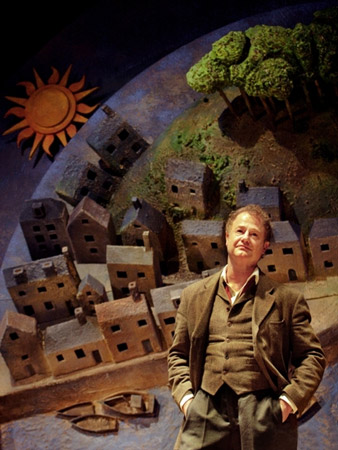
| HOME |
| NERVE |
| REVIEWS |
| ARCHIVE |
| EVENTS |
| LINKS |
| ABOUT US |
| CONTRIBUTORS |
| BACK ISSUES |
| CONTACT US |
Under Milk Wood
 By Dylan
Thomas
By Dylan
Thomas
Directed by Terry Hands
Clwyd Theatr Cymru
Liverpool
Playhouse
22nd May 2014
Reviewed by Joe Coventry
Photograph by Catherine Ashmore
Time Passes . . . Time Passes . . .
Thomas originally wrote his best known work as a play 'for voices' about six years before his untimely death at 39, when touring the USA in 1953. He famously performed in the piece as First Narrator on a handful of occasions before his high life alcoholic and cigarette smoking excesses did for him ; the very antithesis of the timeless village life represented in this 60th anniversary performance of its premiere in this country.
The imaginary setting of the play is based on the Welsh villages of Laugharne and New Quay where Thomas spent his childhood and early adult life here transposed to Llarreggub, (Bugger all), spelt backwards; essentially this is what the 24 hour timescale of the open-ended inconsequential action is all about.
The lights went up on a simple but effective stage; two rising spiraling arms around a circular space enclosing a largish cast of 11 players, (playing 68 characters). This was mirrored by a birds eye view of a fishing village encircled by a wood and hilly promontory, courtesy of designer Martin Bainbridge. Karl Sydow, Roger Chapman and CAPA were the production team while the ex-Everyman's Terry Hands directed.
In this place, where not much ever happens, the action commences with everyone asleep with their dreams and fantasies as Narrator (Owen Teale) describes the black, black somnolent streets, hushed woodland wildlife and fishing boats gently bobbing up and down on the quay. It is a magical opening, the Welsh bard's prose pregnant with an expectation of the past lives, loves, places and events to be conjured up by the multi-roled cast.
Blind Captain Cat dredges memories of his old boat, 'The Kidwelly' and its crew, and the love of his life, Rosie Probert (Sarah Harris-Davies), all now dead. Ifan Hew Dafydd also plays lecherous Mr Waldo, in search of a woman as soft as Eve but as hard as sciatica; Mog Edwards (Richard Elfin) extols the virtues of his sweetheart Myfanwy Price (Caryl Morgan) and she him, but they will never marry in daylight.
Hedydd Dylan is the survivor of two husbands in Mrs Ogmore-Pritchard and the nappyline obsessed Polly Garter; Mr Pugh dreams up endless ways of poisoning his wife and other residents, including the Rev Eli Jenkins, Dai Bread, lithe Gossamer Benyon and pint swilling Sinbad Sailors amongst them, live out their own nightmares, losses or if only's ..... hush now..... hush now..... let them sleep, for it will soon be dawn.
As the sun comes up milk churns are filled, animals fed, fires are stoked and the smell of baking bread fills the air, along with the peeling of church bells and childrens laughter and steamed open mail arrives at its intended destinations. Here, everyone already knows what is going on, for day after day not much ever changes amongst the niceties and boredom, the sexual frustration and un-wishfullfilled lives of the inhabitants, which is only enlivened by tittle-tattle and malicious gossip around the fountain or the banter in the local. The stultifying sun rides high in the Spring sky and the air is scented in the gentle breeze... it has always been thus.
Amongst the bumblings and interactions the sea, too calm to put the boats out, has come second to the pub; first kisses and shrieks of derring-do in the leafy lanes signal the end of school; the churchyard becomes a place for contemplation; the long grass for self-titillation, if nothing more exciting. The sun having completed its round Llareggub prepares to bed down as dusk comes on apace. In the brightly lit Sailors Arms those still up sing one last lusty song before staggering off home. It is now black, black night again ...... time passes..... time passes.....hush now.
To their credit the whole cast carried this off well, although the whiny high-pitched accents of some of the male cast was at times a bit jarring. Nevertheless, this was worthy of a production in the Centenary year of Thomas's birth and was warmly received by the matinee audience.